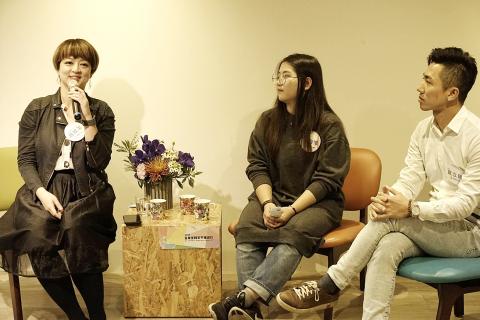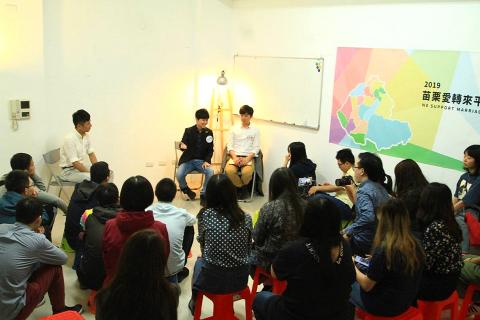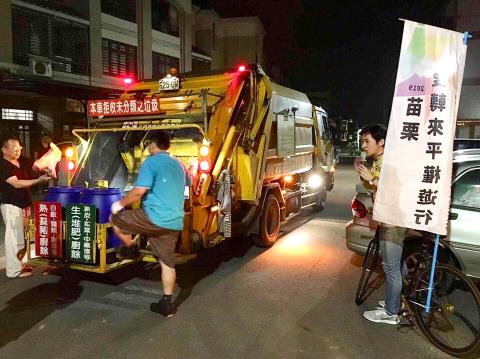Over 16 years, the LGBT pride parade in Taipei has grown to international proportions, with organizers saying that it attracted 137,000 people last year. Apart from the capital, nine other counties also have their own annual pride events.
On Saturday, Miaoli will host its inaugural pride parade and join their ranks.
The parade to celebrate LGBT identities is a response by a group of Miaoli-born young professionals to the results of last November’s national referendum, in which a majority of voters rejected same-sex marriage and LGBT-sensitive sex and gender equity education.

Photo courtesy of Miaoli Loves to Turn
It is a culmination of months of public outreach and education, led by co-conveners and Miaoli natives Huang Hai-wei (黃海惟) and Hsia Li-min (夏立民).
Planning for Miaoli’s own pride parade began right after the referendum. Since February, the organizers have held a book exhibition and sharing sessions by prominent LGBT personalities and allies with links to Miaoli to combat ignorance about LGBT rights in the county.
Huang tells the Taipei Times that the organizers are driven by a desire to “provoke” change in the hearts and minds of Miaoli’s people.

Photo courtesy of Miaoli Loves to Turn
“Lack of understanding is very likely to lead to discrimination and fear,” Huang says. She adds that many Miaoli residents who reject LGBT-friendly positions may not actually know anyone who is living as an out lesbian, gay, bisexual or transgender person.
The parade and other outreach activities are intended to bridge that gap, laying the groundwork for more residents to learn about the lives of LGBT people and recognize that they are already part of the same community.
It will also be Taiwan’s last large-scale pride event before same-sex marriage becomes legal on May 24.

Photo courtesy of Miaoli Loves to Turn
COMING OUT, COMING HOME
The parade’s organizing team has an average age of 32 and draws primarily from Miaoli-born youths who have returned home after spending time away for work and studies.
Huang herself moved back to Miaoli last year to start a business, while Hsia is currently based in Taipei, where he and his partner registered a same-sex partnership in 2016.

Photo courtesy of Miaoli Loves to Turn
The event’s official name, Miaoli Loves to Turn (苗栗愛轉來平權遊行), is a call for Miaoli natives who have moved away to show up for their hometown and support the freedom to love.
The organizers share an inside joke that every event they have put on this year has been history in the making, because any level of community organization around LGBT issues is unheard of in Miaoli.
“In the past, even I would have found it difficult to imagine [LGBT-focused] activities like this happening in Miaoli,” Huang says.

Photo courtesy of Miaoli Loves to Turn
The reaction so far has been largely positive. Huang says that any intolerance has been kept to a low level. Several local businesses have publicly expressed support for marriage equality, sporting declarative posters and stickers. These are provided by the parade organizers to identify LGBT-friendly businesses.
Miaoli is notable for being a bastion of Hakka culture, and one of only two counties in Taiwan with a majority Hakka population. This is not a mere stereotype — Hakka identity and what it means for both the individual and society come up often in conversation with community organizers.
“Compared to Minnan people, Hakka people are just a little more traditional and conservative,” Huang says. In that environment, “no one dares to make any grand statements” that express an opposing viewpoint.
“Miaoli is a place held captive by party affiliation,” she adds, pointing out that governance of Miaoli has never changed hands from the China-friendly blue camp.
With this sense that elections and referendums have proven futile to realize their vision for their hometown, the parade organizers are breaking the mold and taking matters into their own hands, with one of the most public displays of personal and political convictions imaginable.
In the process, appealing to Miaoli’s residents as fellow Hakka people, including literally using the Hakka language to talk to them about LGBT issues, has become an important way to get their message across.
Earlier this year, parade organizers invited Jovi Wu (吳少喬), a Hakka woman from Miaoli now raising her six-year-old daughter in Taoyuan, to share her experiences as a lesbian mother at a public talk.
“Most Hakka people, when facing what they perceive as discrimination or bullying, will not necessarily talk about it out loud,” Wu tells her audience gathered in a bookstore, “because Hakka people have a habit of swallowing their pain.”
By articulating the rejection they have faced from family, strangers and faceless institutions because of their sexuality, Wu and other activists are owning their experiences and adding their voices to the story of Miaoli and Taiwan’s Hakka people.
And for the very first time on Saturday, all of those voices will be heard on Miaoli’s streets.

On April 26, The Lancet published a letter from two doctors at Taichung-based China Medical University Hospital (CMUH) warning that “Taiwan’s Health Care System is on the Brink of Collapse.” The authors said that “Years of policy inaction and mismanagement of resources have led to the National Health Insurance system operating under unsustainable conditions.” The pushback was immediate. Errors in the paper were quickly identified and publicized, to discredit the authors (the hospital apologized). CNA reported that CMUH said the letter described Taiwan in 2021 as having 62 nurses per 10,000 people, when the correct number was 78 nurses per 10,000

As we live longer, our risk of cognitive impairment is increasing. How can we delay the onset of symptoms? Do we have to give up every indulgence or can small changes make a difference? We asked neurologists for tips on how to keep our brains healthy for life. TAKE CARE OF YOUR HEALTH “All of the sensible things that apply to bodily health apply to brain health,” says Suzanne O’Sullivan, a consultant in neurology at the National Hospital for Neurology and Neurosurgery in London, and the author of The Age of Diagnosis. “When you’re 20, you can get away with absolute

May 5 to May 11 What started out as friction between Taiwanese students at Taichung First High School and a Japanese head cook escalated dramatically over the first two weeks of May 1927. It began on April 30 when the cook’s wife knew that lotus starch used in that night’s dinner had rat feces in it, but failed to inform staff until the meal was already prepared. The students believed that her silence was intentional, and filed a complaint. The school’s Japanese administrators sided with the cook’s family, dismissing the students as troublemakers and clamping down on their freedoms — with

As Donald Trump’s executive order in March led to the shuttering of Voice of America (VOA) — the global broadcaster whose roots date back to the fight against Nazi propaganda — he quickly attracted support from figures not used to aligning themselves with any US administration. Trump had ordered the US Agency for Global Media, the federal agency that funds VOA and other groups promoting independent journalism overseas, to be “eliminated to the maximum extent consistent with applicable law.” The decision suddenly halted programming in 49 languages to more than 425 million people. In Moscow, Margarita Simonyan, the hardline editor-in-chief of the